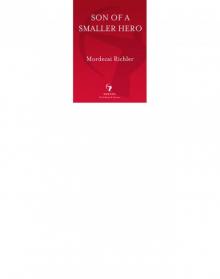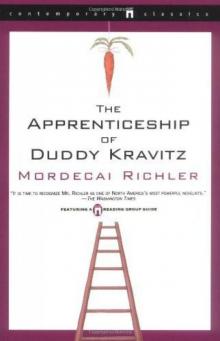- Home
- Mordecai Richler
A Choice of Enemies Page 7
A Choice of Enemies Read online
Page 7
“Welcome to the Young Pioneers, Kensington Division,” he said. “Mandrake Lawson’s show begins at four.”
Charlie was giving a party for the émigré children. An amateur magician, he was going to perform for them as well. Sally discovered that Joey was worried because Charlie’s deal to do a picture for Winkleman had hit a snag. They were broke, she gathered, and not very popular. But Charlie was sure that the deal would work out. Sally let an hour go by before she asked about Norman. Norman had been away for two weeks and she had yet to hear from him.
“We haven’t heard a word either,” Charlie said.
Joey told her about Nicky’s death.
“Hold on a sec,” Charlie said, “I’ll go and see if there’s any mail.”
As soon as Charlie had gone Joey shed her glasses and turned solemnly to Sally. “Are you very fond of Norman?” she asked.
“Why?”
“I’m not trying to snoop,” Joey said, “believe me, but for your own good you may as well know right now that Norman is very erratic. He’s also selfish, thoughtless, and irresponsible.”
“I don’t see that this has anything to do with me,” Sally said coldly.
“Maybe not,” Joey said. “But you’re young and impressionable. I’m only telling you this because I don’t want you to build up things in your mind when –”
“I’m fond of Norman,” Sally said, rising, “but no more.”
Charlie returned, breathless. “No mail.” He turned to Sally. “Aren’t you staying for the party?”
“I really must go.”
After Sally had gone Charlie noticed that Joey was in tears.
“What happened?”
“I’m not staying for your party either,” Joey said, getting up. “How can you do this to me?”
“Do what,” Charlie asked. “Beat you?”
“A children’s party,” she said. “Haven’t you any feeling?”
XII
The first weeks of summer in London were the loneliest Sally had ever experienced. Every day she raced eagerly forth to adventure: none came.
Bob Landis took her out twice. She was flattered, and she certainly would have gone to bed with him that night after the theatre if, no sooner than he had succeeded in removing her blouse, he hadn’t said, “You know that I’ve got a wife, baby, and that this is just for kicks,” which had given her the giggles.
At night Sally often cried herself to sleep. She visited the British Museum, she went to the theatre, she stood on Westminster Bridge and she swept through gallery after gallery until her feet ached. The West End, except for the grand swing of Regent Street, was another disappointment. This seemed to be little more than a second-rate, inchoate Broadway. America’s hit tune of last year triumphant again in the record shops of Charing Cross Road. Broadway’s hit musical of 1948 a hit again at the Hippodrome. Johnny Ray at the Palladium; Billy Graham at Harringay. At night the parade of depraved itchy faces, men in black rubber trenchcoats and whores past the indecent age, was the most appalling she had ever seen.
So Sally, ordinarily the most inadequate of correspondents, wrote her father every night. She missed her family, her friends, her own comfortable bedroom and, most of all, her bath. Missing these conveniences made her feel even more wretched. For when friends of the family had returned after a summer in Europe only to complain about the filth and the inefficiency she had summarily dismissed them as “middle-class,” a word which until recently had epitomized everything she abhorred.
One evening Sally set out to fish for sexual experiences in the espresso bars of Hampstead. Her first bite came from an elderly roué who was unhooked like a catfish. The next few nibbles were hardly worth the bait. A non-objective painter with the necessarily rotten teeth, a Dane who translated Chinese poems from the English of Arthur Waley, and an assistant television producer who wore a black turtleneck sweater and corduroy trousers. Denis Patmore was the last boy’s name, and he took her to a bottle party at a friend’s studio the next evening.
“I just don’t dig Freud on people,” a girl said, “that’s all.”
The floor was heaped with unwashed girls in blue jeans and sweaters. Bleached ones, black ones; plump and unplundered ones. A long loony-eyed one with a fistful of teeth and another one with pillowy breasts. But the men, after you allowed for a few exceptions, were a much drier lot. They seemed afraid that they would be devoured like pretzels after the next round of drinks. One of the exceptions was an obese art critic with stinging red eyes: “Higgins is a clod. The silly fool can’t get his roger up unless Inga wears handcuffs.” An emaciated man, who described himself as a writer of “progressive space-fiction,” sold Sally two tickets to a meeting of the Anglo-Rumanian Friendship Society. A Negro novelist wiped his wine-stained hands on her skirt. “The world,” he said, “is so completely,” before he staggered off.
That’s when Sally was introduced to a tall, silent, dusty-haired boy. “I am a student,” he said stiffly. “My name is Ernst.…”
“Are you a German?”
“Austrian.”
A few days later, nearly a month before Sally was to begin work, she ran into Ernst again. They met in the back room of Collett’s bookshop on Haverstock Hill. Ernst was there first. When Sally entered he moved swiftly away from a shelf, then, recognizing her, he smiled ambiguously.
“Do you read very much?”
She could have kicked herself for saying that.
“Adventure stories,” Ernst said guardedly, “and books about medicine. I am very interested in medicine.”
“Is that what you’re studying?” Sally asked.
“Studying …?”
“You told me you were a student.”
“I am studying … law.”
They both recognized the lie at once. Then Sally recognized something else – there was a bulge under Ernst’s jacket. “Let’s go,” she said, taking his arm. “We’ll have tea together.”
“I have no money.”
“Come,” she said impatiently, “don’t be an ass.”
Her heart pounded wildly as they passed the bookshop manager. But they made it safely outside.
“Halfers,” Sally said.
“What?”
“We split the books.”
Ernst frowned.
“You’re not going to pretend,” Sally said, “are you?”
“No.”
He brought out the books. A copy of Kon Tiki and a travel book on Africa and an English-German dictionary.
“I’ll settle for the book on Africa, O.K.?” Sally’s smile faded. “You’re not a student.”
“No,” Ernst said. “I’m not a student.”
“I’m not a student either,” she said, as they turned down Belsize Avenue. “I’m Moll Flanders; shop-lifter extraordinary.” She explained who Moll Flanders was. “I’m being silly,” she said, “forgive me.”
“Where are we going?”
“To my place,” she said, “for tea and bickies.”
At last her meaning was clear to him. He wasn’t shocked either. Usually they were older, less attractive.
“O.K.,” he said.
The room was in a chaotic state. Records and books were scattered all over the floor. The one hard-backed chair was smothered under a heap of clothes. But the clothes, Ernst noticed, were expensive. The leather suitcases piled slipshod over the wardrobe were of a superior quality.
“It’s not much,” Sally said, “but it’s home.”
When she turned round again Ernst had already taken off his shoes. He was unbuttoning his shirt.
“What are you –”
Ernest took her into his arms and kissed her on the mouth. Struggling free, Sally slapped him hard across the face.
Ernst didn’t move. “Why did you bring me here?”
“Isn’t it obvious?”
“Yes,” he said, “I thought so.”
“You thought so! I thought you’d like a cup of tea.”
“Don’t make me laug
h.”
Sally stared at him. “Are you serious?”
“What do you want?” Ernst asked.
“But I don’t want anything.”
“You mean,” he said, “that … tea?”
Sally held up the kettle and tapped it with her finger, but Ernst still seemed a little incredulous.
“I had thought –”
“– that I was some kind of sex maniac?”
“No, but –” He broke off with a cautious smile. “Tea. I see. Tea.”
But he didn’t see.
“I’m sorry that I slapped you,” she said.
Sally put on a record. Mozart’s Prague symphony. “Are you hungry?” she asked him. “Can I make you something to eat?”
“If it ain’t too much trouble.”
She made him an omelette. He ate six slices of bread with it. Meanwhile, Sally curled up watchfully on the bed with her legs tucked under her skirt. Mozart’s Prague symphony began to play over again.
“Who are you?” she asked.
“My name is Ernst Haupt. I am a law student. I come from Innsbruck. I am here on a scholarship.”
“Come off it.”
Ernst rose. He was taller than she had thought. More formidable looking too. A lean, lethal man, with an unnervingly sensual manner. That late afternoon sun lit his hair fiercely. She wondered how old he was. At times he seemed a boy, but right now he looked thirty or more. Thirty or more, and frightening.
“Do you mind if I turn off the record player?”
When he bent over to turn off the player she noticed the running scar on the back of his neck. A knife scar.
“How old are you?” she asked.
“According to my father I would be twenty-two now.”
“According to your father?”
“The records were destroyed in a raid.” He looked at her searchingly, his expression severe. “Are you afraid of me?”
“No,” she said too quickly, “of course not.”
“I haven’t had anything to eat since yesterday noon.”
“Haven’t you any money?”
“Money.…”
“Can’t you work?”
“I’m here illegally. I’m from East Germany. I have no papers.”
“Where are you staying?”
“Here and there.”
“You haven’t got a room. Is that what you mean?”
“I can take care of myself.”
“But what do you do?” Sally asked nervously.
“When I was fourteen they put me into the army.”
“I mean are you qualified for a job?”
Ernst smiled.
“That’s not a job. I mean a proper job.”
“I can speak five languages.”
“That’s something.”
“There are people who can speak eight. Ten. And most of them are without work.”
“What do you want to do then?”
“I want to go to America. I would like to be rich.”
“So,” Sally said, “you’re the same as everyone else.”
“Naturally.”
“Natürlich.”
“You speak German?”
“A little,” she said.
“I hate Germany. I hate Germans.”
“So do I,” Sally said.
Outside, it was growing dark. Ernst walked over to the bureau and picked up a hairbrush. He came to her and sat down on the edge of the bed. Sally took a deep breath; she prepared to scream.
“It is so good when a girl brushes your hair,” he said.
“… what …?”
“Please,” he said.
Sally took the brush and began to stroke his hair.
“I’m warning you,” she said as lightly as she could, “I don’t like men who pamper themselves.”
“Would you like to do the back of my head now?”
He turned round. She began to do the back of his head.
“I am handsome,” he said.
“Bully for you.”
“I beg your pardon.”
“Skip it.”
“I’m very good with women.”
“Do you carry written testimonials around with you?”
“I will get a rich American one and she will take me to the United States.”
“I could write to my father. Maybe he can get you into Canada. Maybe he can even get you a job.”
Ernst was encouraged. “I used to be a bigshot in the communist youth,” he said. “I could write an exposé for the newspapers.”
“That wouldn’t impress my father, I’m afraid. He’s a bit of a Red himself.”
“A communist,” Ernst said. “In Canada?”
“Not quite.”
“What do they know about communism in Canada?”
“A lot more than you’d think,” Sally said, annoyed.
“Wait.” Ernst took off a sock and held a burning match to his foot. “A whole winter without shoes. All our food went to Russia. That’s communism.”
Sally watched as he lit another match to his exposed foot. She thought it vulgar of him to be so free about what he had suffered.
“Perhaps Germany didn’t deserve better,” she said, “after what they did in Russia.”
“Me? I did?”
Then, briefly speechless, they both realized that they were together on the bed. Sally reached out a little frightened and touched Ernst’s face where she had slapped him. He smiled and kissed her on the throat, then behind the ear, and at last on the mouth. Oh, it was all so expertly done. Sally broke free.
“I wouldn’t want you to think that I didn’t invite you up here for tea after all.”
Ernst put his finger to his mouth and, with his other hand, pointed at the door.
“What is it?” Sally asked, alarmed.
Ernst tip-toed to the door. “He’s gone,” he said.
“What are you talking about?”
“There was somebody listening at the door.”
Karp, she thought. “Don’t be silly,” she said. His smile was so insufferably thick with superior knowledge that she’d be damned before she would agree with him. “This isn’t Germany,” she added.
“Perhaps I should go.”
“Why?”
“You’re angry with me.”
“I’m angry with myself.”
Sally got up, turned on the hot water faucet with a fierce twist, and smacked two blouses into the sink. Ernst watched. He and Sally were almost the same age. He was sure that rain had ruined at least seven of her Sundays, that she had quarrelled with her brother over whose turn it was to wash the dishes, and that her mother had refused to allow her to stay out late one night and, as a result, Sally had sworn never to speak to her again. She came from an ordered past. She broke and made up with boy friends and trusted strangers. He had read about such things in American books; they were probably true. Ernst got up and, too late to restrain himself, kissed Sally softly on the neck. He retreated quickly, before she could turn round to reprimand him.
“Throw me your shirt,” Sally said. “It’s filthy.”
He took off his shirt and passed it to her meekly.
“You want me to stay?”
“You’ll sleep on the floor,” she said, “but no funny stuff, understand?”
“You are very kind.”
“Have you any other things?”
“A little suitcase.”
“You can go and get it tomorrow morning. Tomorrow I’ll speak to Karp about a room for you. We can go shopping for some clothes in the afternoon. I’ll lend you the money.”
No sooner had she made her offer than Sally took fright. A whole night with him on the floor. He might be dangerous, she thought. “I may be able to get you into Canada,” she said, “but I’m not a rich one.”
“Don’t make fun of me.”
Sally smiled. “Would you like another omelette?” she asked.
“No.”
“Sure?”
“Yeah. But would you
brush my hair again?”
“Nothing doing.”
“Tomorrow morning,” he said eagerly, “I will wash and wax your floor for you. I will put your room in order.”
Tomorrow morning, she thought with sudden anger, out you go. I swear it. Enough, she thought, is enough.
2
I
KARP WAS SURPRISED TO SEE NORMAN. HE HADN’T expected him back for at least another month.
“You look well,” Karp said. “Are you glad to be back?”
“I can’t tell you how glad.”
Karp spread himself out on the edge of the bed, holding his ham sandwich in his saucer and watching Norman shave. There were four back copies of the Saturday edition of the Montreal Star stacked on the bed; Karp forwarded the rest of Norman’s mail.
“And the room,” Karp asked, “it pleases you? I had it painted.”
Norman, who had just arrived that morning, grinned through his shaving lather. “The room looks wonderful,” he said, “and I feel wonderful.”
Karp ripped off a corner of his ham sandwich; he fell on his food like a conqueror. Norman, however, couldn’t tell whether this was a true characteristic of Karp’s or simply another way of ridiculing others. “French bread is bad for me,” Karp said. “One is obliged to open one’s mouth too wide. But ham is first-rate. It doesn’t jam in one’s teeth like cheap cuts of beef.” Karp prodded a tooth with a stubby forefinger and freed a sliver of bread from a cavity. “Why don’t you ask me about Sally? Isn’t that why you rushed back?”
“All right. Where is she?”
“Out for a walk. She’ll be back soon, I suppose. I told her you were here. Can’t you wait?”
Norman laughed.
“And your trip,” Karp asked. “Did you enjoy yourself?”
“Yes and no.”
After a few days in Paris Norman had gone to Toulouse, where he had spent a week with Pepe Santos. Santos, formerly a colonel in the Spanish Republican Army, had been an intimate friend of Norman’s father. The two men had talked endlessly about Dr. Max Price.
From Toulouse Norman had gone to Madrid.
And there, leaning against the trunk of an olive tree at the University City, there, watching the indifferent young pass hand-in-hand over the indecently green meadow where, it seemed to him, the best blood of his generation had been spilled, he pondered over Nicky, his desire for a family of his own and, ultimately, the death of his father.

 Dispatches From the Sporting Life
Dispatches From the Sporting Life The Acrobats
The Acrobats Son of a Smaller Hero
Son of a Smaller Hero Jacob Two-Two-'S First Spy Case
Jacob Two-Two-'S First Spy Case Jacob Two-Two Meets the Hooded Fang
Jacob Two-Two Meets the Hooded Fang Jacob Two-Two and the Dinosaur
Jacob Two-Two and the Dinosaur Joshua Then and Now
Joshua Then and Now Solomon Gursky Was Here
Solomon Gursky Was Here Cocksure
Cocksure The Street
The Street The Apprenticeship of Duddy Kravitz
The Apprenticeship of Duddy Kravitz A Choice of Enemies
A Choice of Enemies Barney's Version (Movie Tie-In Edition)
Barney's Version (Movie Tie-In Edition) St. Urbain's Horseman
St. Urbain's Horseman The Incomparable Atuk
The Incomparable Atuk Barney's Version
Barney's Version